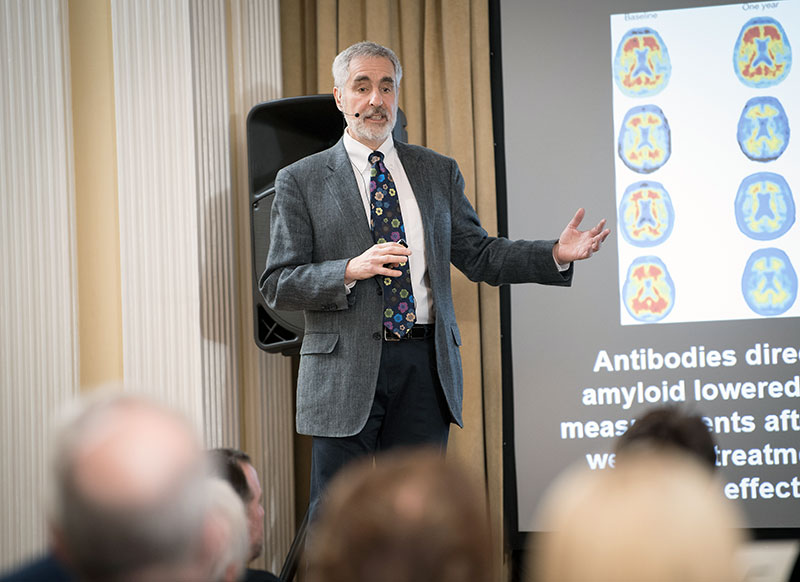
Dr. William Jagust of the University of California, Berkeley described findings related to Alzheimer's disease and the biomarkers of aging during the Dallas Aging and Cognition Conference recently.
About 250 cognitive neuroscientists recently converged at the Center for Vital Longevity’s fifth biennial Dallas Aging and Cognition Conference to discuss the latest developments in topics ranging from the biomarkers of aging and Alzheimer’s disease to the concept of cognitive reserve.
The conference, made possible with the support of the School of Behavioral and Brain Sciences and the Office of the Provost, attracted scientists from more than 50 universities from across the globe and focused on four themes: “Neural Organization and Connectivity,” “The Biomarkers of Successful and Unsuccessful Aging,” “Cognitive Reserve,” and “Neural Stimulation, Cognitive Training and Enrichment.”
Dr. William Jagust of the University of California, Berkeley presented findings that suggest how the pairing of biomarkers such as amyloid plaque with studies of behavioral and neural changes can shed light on some cognitive changes that have previously been chalked up to normal aging but may reflect the early stages of Alzheimer’s or other forms of dementia.
Dr. Cheryl Grady of the University of Toronto described how functional neuroimaging has made the studying of cognition easier by showing dynamic brain activity and patterns of connectivity, which greatly affect a person’s performance on a variety of cognitive tasks.
“Older adults have weaker connections within brain networks but stronger connections between networks compared to young adults, and this has a big influence on memory ability,” she said.
About the Conference
Since 2010, the Center for Vital Longevity at UT Dallas has brought together research scientists focused on the cognitive neuroscience of aging to share their latest discoveries and insights through invited and submitted platform talks and poster presentations.
Dr. Yaakov Stern of Columbia University shared his hypothesis of “cognitive reserve,” which holds that achieving higher levels of education and leading a more proactive, intellectually stimulating lifestyle may help people at-risk of cognitive decline stave off dementia longer.
“The flexibility and adaptability of brain networks underlying cognitive function may also allow some people to cope better with age- or dementia-related brain changes than others,” he said.
In terms of improving cognition, Dr. Cindy Lustig of the University of Michigan explained how some cognitive training programs show beneficial effects not only on brain networks, and but also on brain structure.
“Many questions remain, though, as to why some programs are effective and others are not, and whether beneficial effects are greater for those with initially low vs. initially high levels of ability,” she said.
For Dr. Denise Park, center co-director and organizer of the conference, the two-day event represented the culmination of a lot of hard work in establishing the conference as an update on the field’s rapidly advancing research. It provides a unique opportunity for scientists who need a forum to share their latest findings, she said.
“I was so gratified to learn from several of the most outstanding young scientists in the field that they decided to study the aging brain and cognition after being inspired by the talks they heard at earlier conferences,” said Park, Distinguished University Chair in Behavioral and Brain Sciences. “Many neuroscientists indicate that they ask new questions, develop new methods and form new collaborations as a result of attending the conference.”